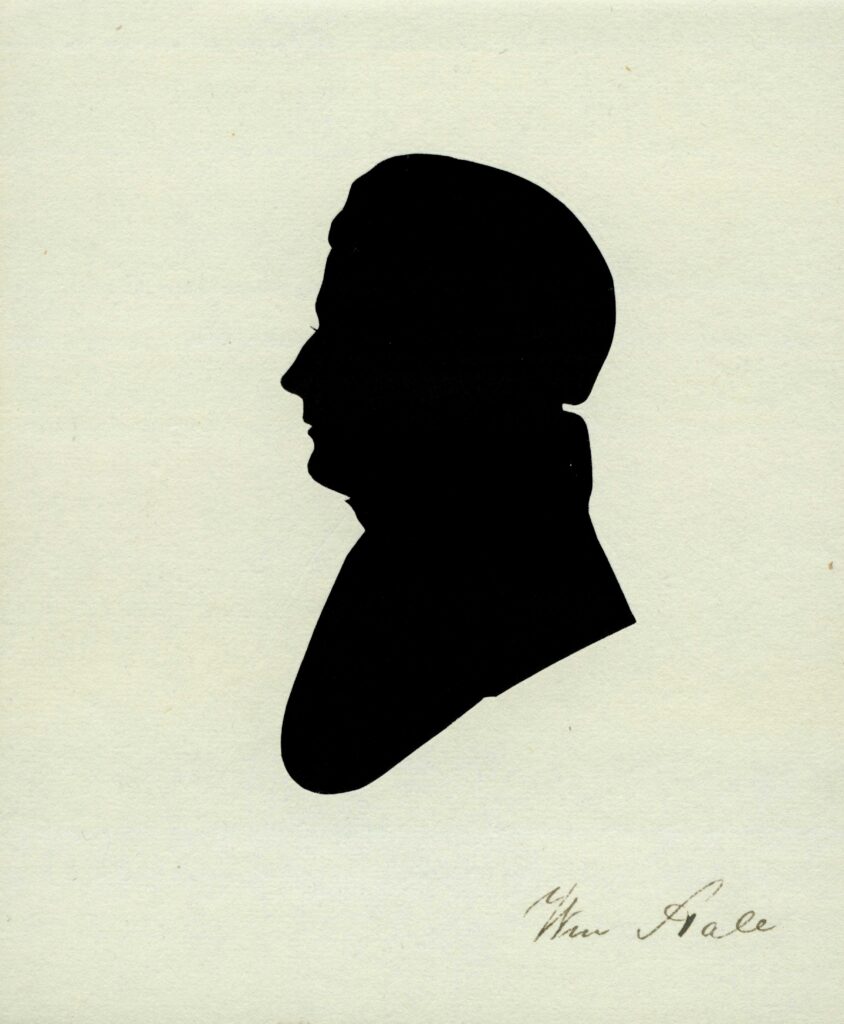
The One Who Got a Bit Too Invested in the Family Business
William Hale was born at Dover, New Hampshire, in 1804. The Hale family was one of the most affluent in New Hampshire. Hale’s father, also named William Hale, was a judge and founded a successful shipbuilding business with his brothers. His mother was named Lydia Rollins. Indicative of his family’s wealth was the fact that Hale grew up in a lavish home on Dover’s Hale Street. The boy may have been acquainted with Alfred Upham, who resided in neighboring Rochester. Hale left New Hampshire for high school to attend the prestigious Phillips Exeter Academy. There, Jonathan Cilley and Josiah Stover Little were likely his classmates. Hale finished his high school education at just sixteen and matriculated at Bowdoin in the fall of 1821.
Hale spent his first year at Bowdoin living with Mark Newman and Samuel P. Newman, Mark’s brother and one of Bowdoin’s professors. Early on, Hale joined the Athenean Society and quickly formed close associations with many of the society’s troublemakers. Among his best friends he counted Nathaniel Hawthorne, Horatio Bridge, and Jeremiah Dummer. Early in his second semester, Hale received his first fine for playing cards with Dummer, but perhaps because of his proximity to a professor, he appeared mostly well-behaved. This state of affairs changed Hale’s sophomore year when he left Professor Newman behind to board with Bridge and John Dafforne Kinsman at Mr. A. Dunning’s. Immediately, Hale began to rack up fines and citations for unexcused absences and neglecting his work. In June of 1823, Hale received a rather notable fine for “causing a drum to be beat in the college yard, after such noise has been publicly prohibited.” Just two weeks later Hale, Hawthorne, Bridge, and Frederic Mellen were caught drinking at a local tavern.
Junior year Hale and Bridge moved on campus together to Winthrop Hall and their joint misbehavior only grew. The two became the charter members of the Androscoggin Club along with Hawthorne and James Ware Bradbury. Though the club had a semi-official name, its primary purpose was to facilitate the drinking of its founding quartet. Hale’s nephew described how “Fortified with a keg of wine and a liberal amount of provender, the club was accustomed to go out on Saturdays for a week end in the forest ‘far from the maddening crowd.’” Because of all the time that Hale spent binge-drinking in the woods, his academics suffered and he received a constantly barrage of fines. Still, the College found his work good enough to award him a Latin dissertation at his Junior Class Exhibition.
During senior year, Hale began to get his act together. He stopped living with Bridge, instead taking the mild-mannered Seward Wyman as his Winthrop Roommate. He continued to cavort with the Androscoggin Club on weekends, but during the week he focused on his schoolwork, meaning his flood of fines flowed to a trickle. Hale even started to take classes at the Maine Medical School on top of his senior studies. At his Senior Class Exhibition, Hale was rewarded with a dissertation of the “The Eccentricities of Genius.” At Commencement he was given the seventeenth rank in the class alongside Cullen Sawtelle and Richmond Bradford and the trio gave a speech on “the comparative Influence of Wealth, Education and Natural Disposition in promoting personal Happiness.”
After finishing Bowdoin, Hale joined his family’s prosperous shipbuilding business. He focused on expanding the company into the hardware industry. He soon gained a reputation as a successful businessman in his own right. In 1831, Hale decided to marry Martha Hale, and no, the shared surname was not a coincidence. Martha was the daughter of Hale’s uncle Samuel, whom he had been working for in Dover. Marrying your first cousin did not become taboo in the United States until the 1880’s, but it is certainly an unusual choice by modern standards. The Hales never had any children. They spent their long lives alone together in their house on Dover’s Locust Street.
As time went on, Hale started to branch out in his business interests. He was an early investor in a steamboat on Lake Winnipiseogee and became the first President of the Cocheco Railroad. Later he became President of the Dover and Winnipiseogee Railroad. Hale also took an interest in politics. He acted as the moderator at town meetings and was elected twice to the state legislature in 1833 and 1834. Faith was also important for Hale. He was a longtime member and vestryman in Dover’s St. Thomas Episcopal Church. Finally, Hale dabbled in philanthropy and donated a good deal of money to the church and impoverished town-members. For these reasons Hale was thought of as an, “eminently a good citizen.” The businessman lived long enough to attend the 50th reunion of his Bowdoin class. He died in 1893 with no heirs and with Martha already in the ground. Hale was remembered as “Cordial and entertaining in his manner, courteous in his speech and action.”